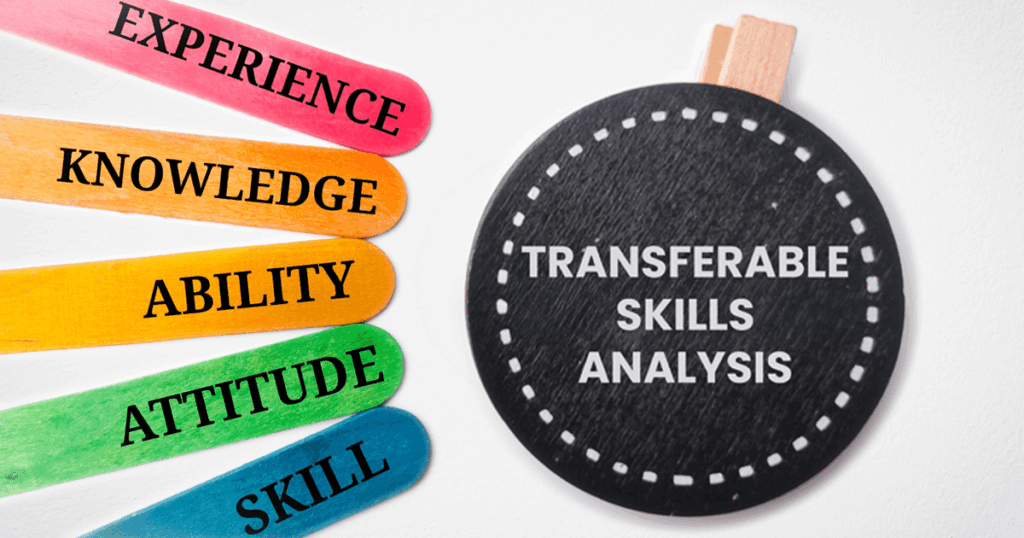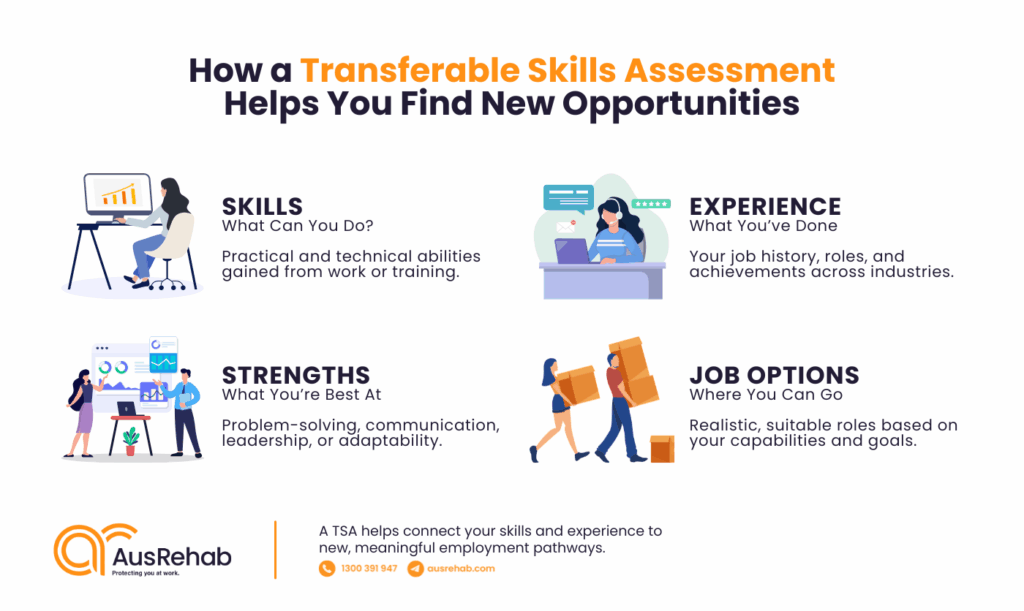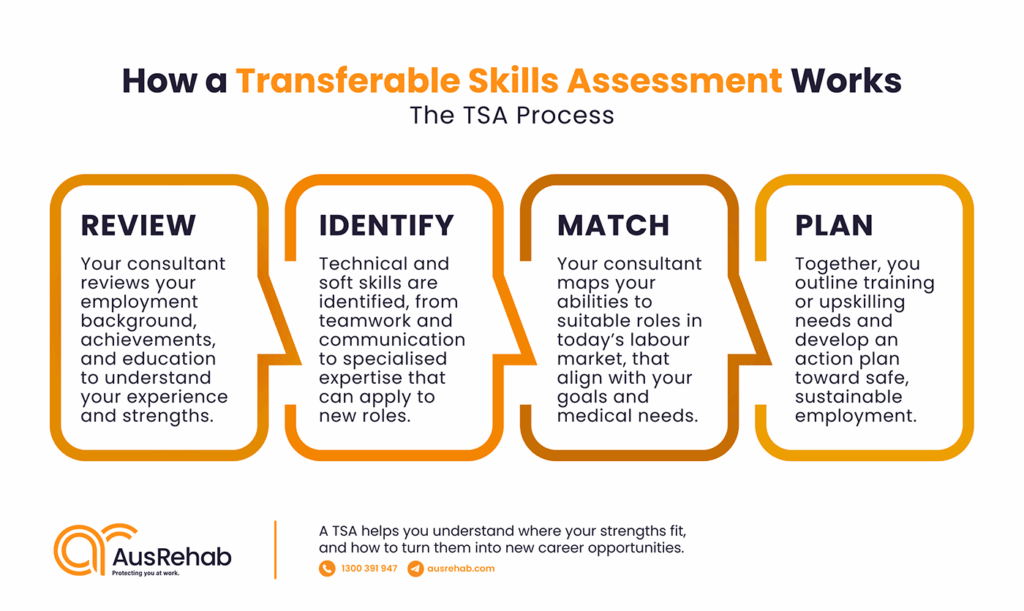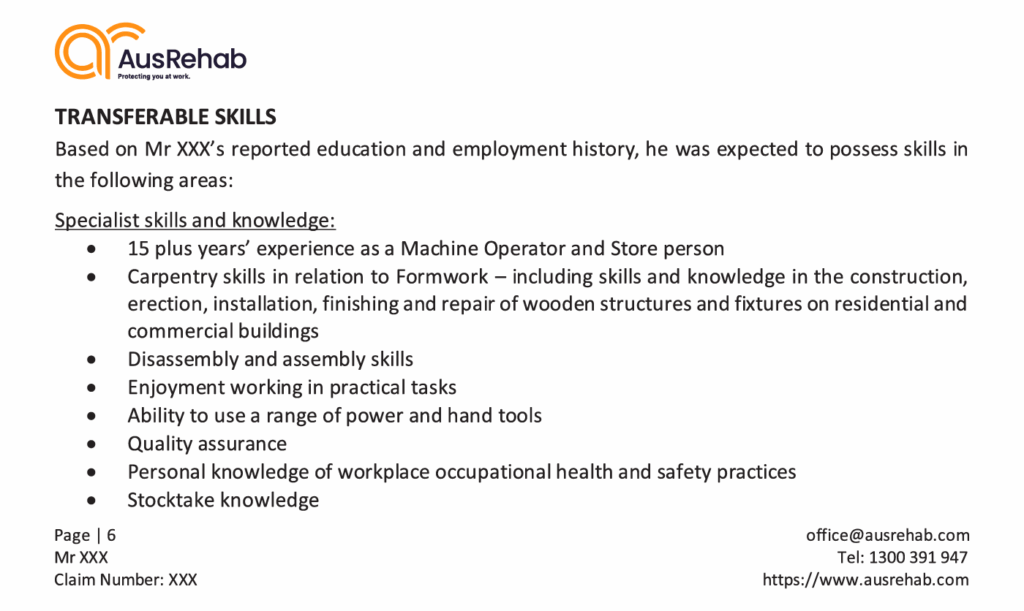
When a work injury affects your ability to perform your previous role, it doesn’t mean your career is over. You may simply need a new direction. A Transferable Skills Analysis (TSA) helps you discover the abilities, experience, and knowledge you already possess and how these can open doors to new, realistic employment opportunities.
A vocational transferable skills analysis focuses on identifying your strengths and matching them with suitable job options that align with your current capacity and interests. It’s about recognising your potential, not your limitations.
At AusRehab, we conduct transferable skills analysis in NSW as part of our workplace rehabilitation services, supporting workers to rediscover their strengths, plan new career directions, and achieve a safe, sustainable career transition after work injury.
A Transferable Skills Analysis (TSA) is a structured evaluation used in vocational rehabilitation to identify your existing abilities, work experience, and qualifications. It helps match your previous roles to new, realistic job options, particularly when your pre-injury duties are no longer suitable.
Unlike general career tests, a transferable skills analysis focuses on practical, proven abilities. It looks at what you’ve developed through past jobs, education, and life experiences to highlight where those skills can be applied next. In other words, it’s about identifying transferable skills for employment and finding meaningful opportunities that align with your current capacity.
For example, a factory technician with good coordination and problem-solving skills may successfully transition into a quality assurance or technical training role. This shows that valuable skills can adapt to different roles when guided by a professional vocational assessment after injury.

A Transferable Skills Analysis (TSA) follows a structured process designed to help you see how your experience and strengths fit into new roles. Each step focuses on uncovering your potential and turning it into real career options.
Here’s what the transferable skills Analysis process usually includes:
✅ Review of work history and qualifications: Your consultant examines your previous jobs, achievements, education, and any additional training to build a clear picture of your professional background.
✅ Identification of transferable skills: Through a detailed transferable skills evaluation, key abilities like communication, leadership, or technical problem-solving are analysed to see how they apply across industries.
✅ Mapping to suitable roles: Using current job market data, your consultant performs transferable skills mapping in NSW to match your abilities to realistic, sustainable employment options.
✅ Identifying upskilling opportunities: If certain skills need strengthening, targeted training or short courses are recommended to support skills mapping for redeployment and long-term employability.
This step-by-step approach, often supported through vocational counselling and labour market analysis, ensures your next career move is based on evidence, opportunity, and confidence.
A Transferable Skills Analysis (TSA) works by reviewing your career history, identifying core strengths, and aligning them with roles that fit your current capabilities and goals. It involves analysing your skills in detail, mapping them to real job opportunities, and planning any necessary upskilling. By the end of the process, you’ll have a clearer view of your career options and practical steps to take toward meaningful employment.

A Transferable Skills Analysis (TSA) is most valuable when an injured worker cannot safely return to their original role. It helps identify realistic and meaningful job options based on the abilities and experience they already possess.
In vocational assessment, a TSA supports recovery by:
A vocational rehabilitation transferable skills analysis often works alongside other evaluations, such as a Labour Market Analysis or Vocational Counselling, to build a complete and practical vocational assessment after injury. Together, these services promote safe, confident, and sustainable employment outcomes.
For example, after a shoulder injury, Tom’s TSA revealed strong leadership and scheduling abilities he had developed over the years in trade work. These skills helped him successfully transition into an operations coordinator role, which shows that one’s capabilities can open doors in unexpected ways.
💡 Note: Your skills are more transferable than you think.
A Transferable Skills Analysis (TSA) is used when a worker can’t return to their previous job or needs to explore new career paths. It looks at their qualifications, strengths, and experience to find roles that fit their current abilities. This process plays a key part in supporting a safe and lasting return to work.
A Transferable Skills Analysis (TSA) offers more than just job suggestions. It gives you clarity, confidence, and a renewed sense of direction during your career transition.
Here are some key benefits of a transferable skills analysis:
✔️ Identifies realistic job opportunities: It matches your abilities and experience with the current labour market, uncovering realistic employment opportunities in NSW that fit your strengths and capacity.
✔️ Builds confidence and motivation: By focusing on what you can do, a TSA helps you recognise your value and approach job searching with optimism.
✔️ Supports career planning and decision-making: It offers structure and direction for career pathway planning in NSW, whether that means retraining, redeployment, or exploring new roles.
✔️ Reduces downtime: A guided RTW plan ensures you stay engaged and transition into work sooner, balancing health, capability, and employability.
✔️ Improves return-to-work outcomes: A TSA contributes to successful, suitable employment assessments in NSW, helping achieve sustainable and rewarding roles.
For example, after completing a TSA with AusRehab, Lisa, a former field technician who could no longer do physical work, discovered that her technical and communication skills were a great fit for a customer service role. The process helped her not only find new employment but also regain her confidence and sense of purpose.
You can learn more about related assessments like Vocational Counselling and Job Placement Support, or explore how our Workplace Rehabilitation Services help bridge the gap between recovery and sustainable employment.
A Transferable Skills Analysis (TSA) is not only for those unable to return to their previous job after an injury. It’s also a useful tool for anyone managing a change in work capacity, career direction, or employment circumstances. Through structured evaluation, it supports safer, smarter, and more sustainable employment decisions.
A transferable skills analysis for injured workers helps identify new roles that align with their existing strengths, qualifications, and functional abilities. It’s often part of vocational rehabilitation assessments, ensuring that recovery leads to meaningful and achievable employment rather than starting over from scratch.
For employers, a TSA supports evidence-based decision-making in redeployment and job placement. It ensures that workers returning from injury are matched with suitable duties that align with their abilities and recovery goals. By partnering with AusRehab’s workplace rehabilitation services in NSW, employers can meet their legislative obligations while maintaining a safe and productive workforce.
Insurers use transferable skills analysis to ensure fair, consistent, and efficient claim management. A TSA provides objective data on an injured worker’s capabilities, helping insurers determine appropriate rehabilitation pathways, funding for training, and realistic return-to-work timelines. This supports coordinated communication between all stakeholders and improves claim outcomes.
A Transferable Skills Analysis (TSA) is ideal for injured workers, employees facing redeployment, and organisations seeking evidence-based placement decisions. It helps align a person’s current skills and abilities with safe, suitable, and sustainable employment opportunities, making it a cornerstone of effective workplace and vocational rehabilitation in NSW.
A Transferable Skills Analysis (TSA) not only identifies what you’re already capable of. It also reveals where you can grow. When gaps exist between your current abilities and potential job roles, the assessment provides targeted training and upskilling recommendations to help you bridge that gap and move confidently toward new opportunities.
At AusRehab, we can connect clients with Registered Training Organisations (RTOs) and accredited providers to design vocational rehabilitation programs in NSW that support meaningful progress. These programs may include short courses, industry certificates, or retraining pathways, and are tailored to each person’s strengths, goals, and recovery plan.
This approach to upskilling and retraining after injury ensures workers are equipped with the right knowledge and confidence to succeed in new or modified roles. For instance, someone moving from a physical trade to an administrative or technical support position might receive digital literacy or project coordination training to support their transition.
💬 Explore short courses and skill development programs through AusRehab to find the right upskilling pathway for your recovery and career goals.
Contact Us Today!Yes. A Transferable Skills Analysis (TSA) evaluates your existing skills and compares them with the demands of potential new roles. When skill gaps are found, it provides tailored guidance on training and upskilling opportunities, such as accredited courses or retraining options. This ensures you stay employable, confident, and ready to take on your next career step.
At AusRehab, every Transferable Skills Analysis (TSA) is conducted by experienced vocational consultants who specialise in identifying practical, achievable career options for injured workers. Each assessment is tailored to a person’s background, recovery progress, and future goals, ensuring outcomes that are realistic and sustainable.
A typical AusRehab transferable skills analysis includes:
What sets AusRehab apart is its collaborative approach, working closely with all stakeholders to support realistic job matching and sustainable return-to-work outcomes. This ensures that each transition isn’t just possible but successful in the long run.
💬 Talk to our New Employer Team to start your Transferable Skills Analysis and begin mapping your next career opportunity today.
Contact Us Today!
Qualified vocational consultants with expertise in workplace and occupational rehabilitation conduct all TSAs. They combine clinical understanding with practical knowledge of the labour market to ensure every assessment is accurate, realistic, and tailored to your recovery needs.
An AusRehab transferable skills assessment covers an in-depth analysis of your work history, skills, and experience. It also identifies retraining needs, outlines career options, and provides a written report detailing achievable pathways and relevant vocational rehabilitation services in NSW to support your return to work.
A Transferable Skills Analysis helps shorten time away from work by identifying realistic and safe job options suited to your capabilities. It boosts confidence, clarifies career direction, and ensures that each worker transitions into employment that is both meaningful and sustainable. Through AusRehab’s guidance, workers and employers alike gain a clear roadmap for successful re-employment.
A Transferable Skills Analysis (TSA) can be the turning point for anyone rebuilding their career after an injury. It provides the clarity, confidence, and structure needed to identify new possibilities and plan a meaningful future.
With the right support from AusRehab’s workplace rehabilitation specialists, your career transition after a work injury becomes an opportunity to rediscover your strengths and redefine success on your own terms. Our vocational rehabilitation services in NSW are designed to help you achieve lasting results and sustainable employment.
👉 Ready to explore your career options? Contact AusRehab now.
📞 1800 991 614
📧 office@ausrehab.com
🔗 Book your Transferable Skills Analysis and start your next chapter today. Learn more about our vocational assessment services.
A Transferable Skills Analysis (TSA) is a structured evaluation used in workplace rehabilitation to identify the skills, knowledge, and experience you already possess. It helps determine how those abilities can be applied to new, realistic job opportunities, especially if your pre-injury duties are no longer suitable. A TSA provides clarity and direction for planning your next career move.
The benefits of a transferable skills analysis go beyond identifying job options. It builds confidence, supports career planning after a work injury, and promotes faster, more sustainable return-to-work outcomes. Workers gain a clear understanding of their strengths, while employers and insurers receive valuable insight for creating suitable and safe employment opportunities.
The duration of a Transferable Skills Analysis varies depending on the complexity of your work history and recovery needs. Typically, it can be completed within one session with a vocational consultant, followed by a comprehensive written report. Your consultant will guide you through each step and ensure the process fits comfortably within your rehabilitation plan.
A TSA helps injured workers identify career paths that align with their current capabilities and restrictions. By analysing past experience and strengths, it provides practical options for redeployment or retraining, ensuring a career transition after a work injury that is both safe and meaningful. This process also helps reduce downtime and fosters long-term confidence in returning to work.
Don’t forget to share!
Subscribe to stay updated on the latest workplace news.

Resolve your work
place injury today